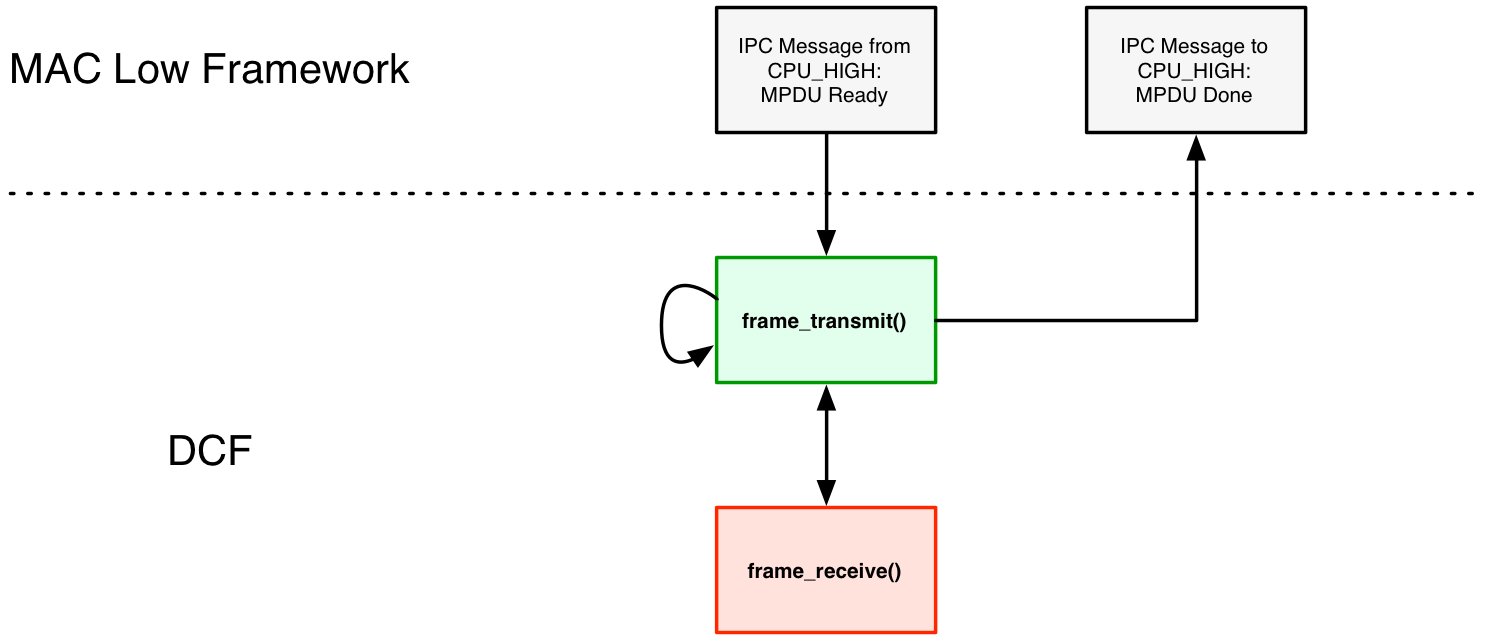| Version 4 (modified by chunter, 9 years ago) (diff) |
|---|
802.11 Reference Design
- Download
- Changelog
- FAQ
- Architecture
Using the Design...
Benchmarks
- IFS Calibration
- Throughput
- Transmitter Characterization
- Receiver Characterization
- Pkt. Det. Min. Power Characterization
MAC
- PHY
Experiments Framework...
- Packet Flow
- FPGA Architecture
- FPGA Resource Usage
- App Notes
- Other Resources
- License
- Changelog
Distributed Coordination Function (DCF)
The 802.11 DCF is responsible for many behaviors. These actions include (but are not limited to):
- Acknowledging good receptions
- Retransmitting failed transmissions
- Carrier Sense Multiple Access with Collision Avoidance (CSMA/CA)
- Binary Exponential Backoff (BEB)
The purpose of this document is not to explain or defend aspects of the DCF. Instead, this document is to aid in the understanding of how the standard DCF behavior is realized within the Mango 802.11 Reference Design. This document is intended to be read alongside the actual wlan_mac_dcf.c and wlan_mac_low.c code themselves.
Rather than structure this documentation as a function-by-function pseudocode equivalent to the above-linked codebases, we will instead approach the documentation from the perspective of two different roles: MPDU transmission and MPDU reception. There is overlap between these roles in what functions they execute (e.g., MPDU transmission still has an element of frame reception to deal with acknowledgments).
MPDU Transmission
From the DCF's perspective, a new MPDU transmission begins when an IPC message arrives from CPU_HIGH with a payload that must be sent. The origin of this payload is irrelevant - it might be an encapsulated Ethernet frame, or it might be a beacon created by the Access Point (AP) project, or it might even be a LTG frame. Those are all concerns of CPU_HIGH. All we care about, in this project, is that there are bytes that must be sent and certain actions may possibly be required of us to modify those bytes (e.g. timestamp insertion in a beacon transmission). The above figure is labeled with P1, P2, and P3. These are generic labels for "processing blocks" and each will be explained below alongside pseudocode the represents the behavior.
P1:
When an IPC message arrives, the MAC Low Framework needs to perform a few different actions before passing the frame off to the DCF for transmission.
Pseudocode:
convert high-level MCS/rate into PHY-understandable rate parameter if( insert duration ) calculate duration of SIFS and ACK insert duration into MAC header if ( insert timestamp ) tell PHY Tx which bytes to overwrite with usec timestamp call the frame_tx_callback()
For the DCF application, the frame_tx_callback() executes the frame_transmit() function in the DCF code.
P2:
The frame_transmit() context will only exit when an MPDU is "done." Here, "done" can mean multiple things:
- If it is a unicast frame and an acknowledgment for that frame has been received
- If it is a unicast frame and all retransmission attempts have failed
- If it is a multicast frame, an MPDU transmission is done as soon as the PHY transmission is complete since no acknowledgment is required.

